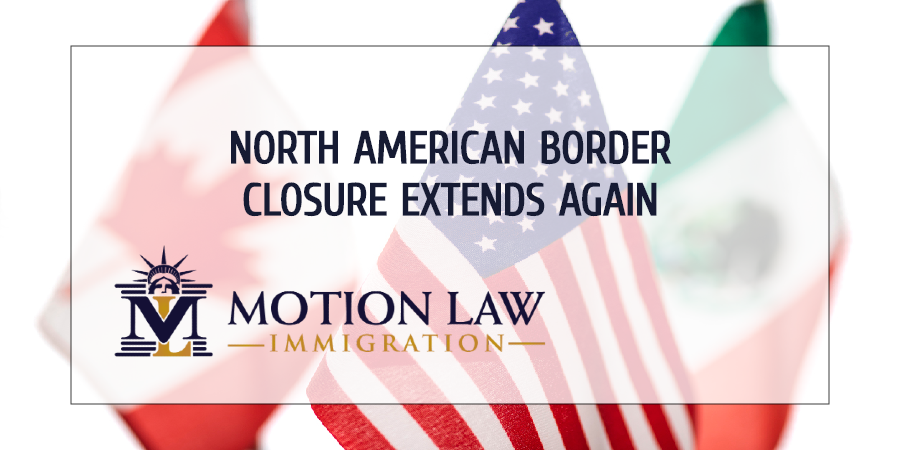North American Border Closure Extends Again

Canada, Mexico and the US create another border agreement
Due to the massive outbreak of Coronavirus in the North American territory, the land borders between Canada, Mexico and the US have been closed for more than two months to any non-essential travel.
This means that the only land transport currently allowed between these three countries is the one that involves trade exchange of any kind.
In fact, the governments decided to create a new North American trade agreement called the United States-Mexico-Canada Agreement (USMCA).
Effective July 1, 2020, this agreement replaced the North American Free Trade Agreement (NAFTA), which had been in effect since 1994.
However, apart from trade exchange, no other type of land transit is currently allowed between these three countries.
Motion Law keeps you up to date with the latest immigration news from the US.
The closing of the borders extends
Traffic on the borders between the US, Mexico and Canada is constant and many citizens of these three nations travel between countries regularly.
With the arrival of the Coronavirus in the North American territory, the borders were officially closed in March and they were supposed to reopen by the end of May.
However, because the US is the main epicenter of the global pandemic and the number of infected people grows exponentially, Canada suggested keeping the borders closed until August.
In addition to that, Mexico is currently going through the peak of infections and the situation is getting worse and worse in this Central American country.
Therefore, in an effort to prevent another massive outbreak of Coronavirus in North American territory, land borders will remain closed until August 21, 2020.
In this way, these three countries refrain from exporting and importing the virus. In addition to that, this restriction does not affect the commercial and economic communication that characterizes the North American territory.
Actually, Canadian Prime Minister, Justin Trudeau, stated: “Every month we have been able to extend the border closures to all but essential goods and services, and those discussions are ongoing with the United States (…) We’re going to continue to work hard”.
Those most affected by this emergency measure are immigrants, mostly asylum seekers, who arrive at the borders of the US hoping to receive international protection and are currently unable to enter the country.
Do you have a pending immigration case? Then please contact us to schedule your FREE Phone Consultation with one of our expert immigration attorneys.
We are here to help you with your case!
We understand that the sudden and abrupt changes that have recently been implemented in the immigration sector of the US have generated anguish among immigrant communities.
Aside from the fact that President Trump has not always agreed with some aspects of immigration, the arrival of the global Coronavirus pandemic also forced the government to implement emergency measures to protect the health of the local population.
Therefore, some of the immigration processes have changed considerably and the requirements have also been modified.
However, your dream of building a promising future in the US should not be held back by current circumstances, on the contrary, you should try to find the right way to follow the process properly.
That’s why the best recommendation for you is to have the constant accompaniment of experts who are up to date with current immigration policies of the US.
This applies not only for immigrants who wish to request entry and residence in the US for the first time, but also applies to foreigners who currently live in the country but need reliable guidance to apply for adjustment of status or any other immigration process.
If you have any questions about an immigration issue or relating to a case you may have currently in progress, then please don’t hesitate to contact us for a FREE Phone Consultation with one of our expert immigration attorneys.
Simply call Motion Law today at: (202) 918-1799.
